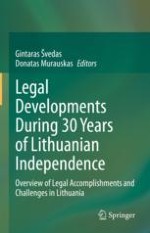
2021 | OriginalPaper | Chapter
1. Transitional Justice Cases Against Lithuania at the European Court of Human Rights
Author : Vygantė Milašiūtė
Published in: Legal Developments During 30 Years of Lithuanian Independence
Publisher: Springer International Publishing
Activate our intelligent search to find suitable subject content or patents.
Select sections of text to find matching patents with Artificial Intelligence. powered by
Select sections of text to find additional relevant content using AI-assisted search. powered by